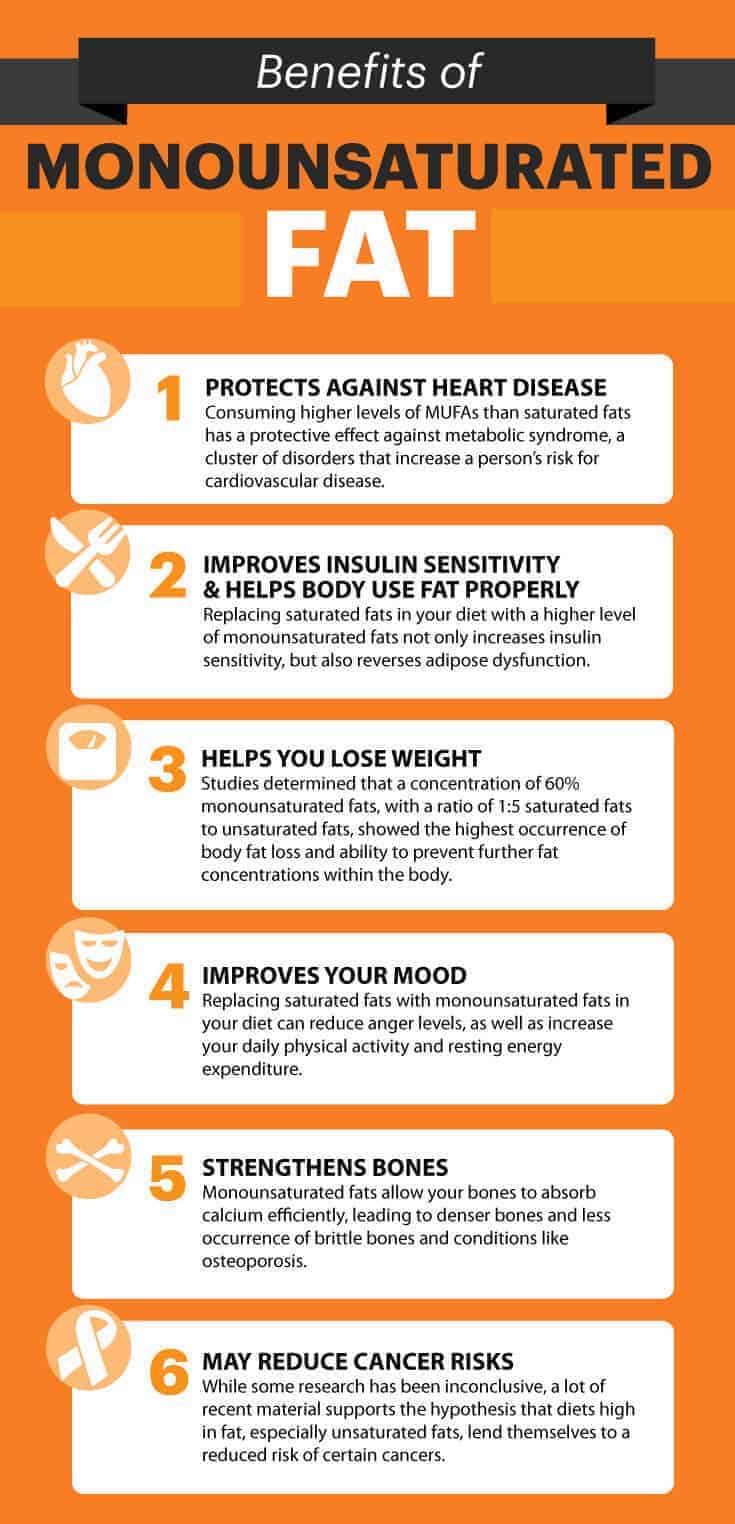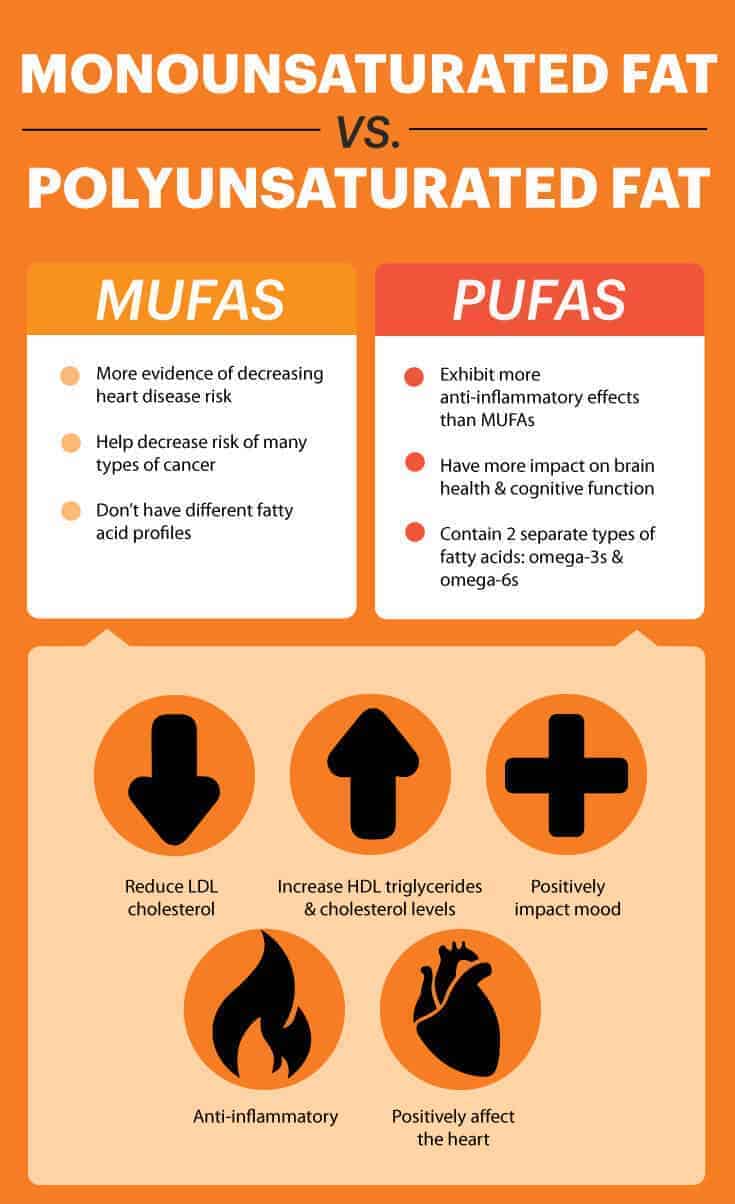By now, you may have heard that low-fat diets aren’t all they’re cracked up to be. Did you know that monounsaturated fat in particular has powerful health benefits?
Over the years, research has slowly proved the fallacy of the “all fat is bad” argument. In fact, we now understand that fats are necessary parts of a healthy lifestyle and body. Monounsaturated and polyunsaturated fats are “essential,” meaning that your body doesn’t produce them on its own and must get them via dietary intake.
Would you be surprised to know that monounsaturated fats can help prevent depression, protect you from heart disease and even prevent certain kinds of cancer? As many people are discovering on the keto diet, these fats are an important element in many of the body’s processes and are also associated with lower body fat content. It’s true.
So, don’t write off fat in your diet. It’s important … and, of course, delicious, too.
What Is Monounsaturated Fat?
There are three fats commonly found in a diet, and all three have different effects and benefits. These three are saturated fat, monounsaturated fat and polyunsaturated fat. It’s important to understand the benefits of the three naturally occurring types of fats in order to include them in your diet properly, as low-fat diets have many risks, including decreased brain function, poor brain health and hormone imbalance.
Ad

A fourth type, trans fat, is an extremely unhealthy byproduct of industrial fat production and should be avoided at all costs. In fact, this type of fat is so dangerous and highly associated with instances of heart disease, high cholesterol and obesity that the U.S. Food and Drug Administration issued a ban on these fats in 2015, giving a three-year limit on their elimination from all processed foods.
In addition, the U.S. Dietary Guidelines Advisory Committee released a groundbreaking recommendation to change its recommended dietary fat intake to include no upper limit on the three healthy types of fats. This was the first time in 35 years any change had been made to the former fat intake guideline.
The committee even took it a step further to say that it does not recommend low-fat diets or lifestyles for obesity prevention. This is a huge positive leap.
Fats are essential parts of your body’s ability to function. From body temperature to weight management, maintaining a good level of healthy fats in your body is extremely important to long-term health.
The truth is that we have heard in the U.S. for decades that low-fat diets are the way to maintain the lowest amount of body fat and stay healthy, but that’s not necessarily true. While it’s true that an overwhelming amount of fat in one’s diet may contribute to weight gain, this is true of any food that contains a high number of calories. Fats are a necessary part of any healthy diet, and you’ll understand why very soon.
Monounsaturated fat is a fatty acid with one double bond in the fatty acid chain with the remainder single-bonded. The melting point of monounsaturated fats, or MUFAs, is between that of saturated fats and polyunsaturated fats (PUFAs), meaning that they’re liquid at room temperature and begin to solidify when refrigerated.
Like all fats, MUFAs contain nine calories per gram and should be consumed in moderation in order to regulate calories to acceptable daily intake levels.
The most common MUFA found in food is oleic acid, a fatty acid that occurs naturally in vegetable and animal oils, especially olive oil. Monounsaturated fats are found often in foods like olive oil, nuts, avocados and whole milk.
Scientifically, research shows that children with high levels of unsaturated fats in their diets have better “serum lipid profiles,” meaning that they actually have less lipids, or fats, in their blood. While this seems counterintuitive, it actually shows that your body was created to process dietary fat in a positive way.
The Mediterranean diet has been highly observed over the years because of its high-fat foods — not surprisingly, if you understand the purpose of unsaturated fats, people in these countries seem to have lower risks of heart disease and certain cancers as opposed to those on the traditional Western diet.
Related: Safflower Oil for Skin and Beyond: Benefits, Uses and Side Effects
Health Benefits
1. Protects Against Heart Disease
The most well-documented benefit of consuming monounsaturated fats is the potential for keeping your heart healthy, especially in terms of replacing high levels of saturated fats with MUFAs. Consuming higher levels of MUFAs than saturated fats has a protective effect against metabolic syndrome, a cluster of disorders that increase a person’s risk for cardiovascular disease.
One study published in the Journal of Nutrition focused on the occurrence of atrial fibrillation, a common type of arrhythmia associated with decreased blood flow to the heart, in women with cardiovascular disease. The results suggested a connection between healthy dietary fat intake and lowered risk of atrial fibrillation.
Researchers have also found that diets high in monounsaturated fat have positive effects on children with high cholesterol and other cardiovascular disease risk factors — even more, in fact, than diets high in PUFAs.
Part of why MUFAs are so important dietarily is because they have anti-inflammatory properties that contribute to the overall health of the body. Because inflammation is at the root of most diseases, any dietary substitution you’re able to make to reduce internal inflammation increases your ability to stave off common diseases and maintain a consistent level of health throughout your life.
Ad

2. Can Improve Insulin Sensitivity and Helps Your Body Use Fat Properly
Another contributing factor to the declining health of much of the Western world is the prevalence of insulin resistance. Considered a very common condition, insulin resistance affects over 3 million people in the U.S. every year.
It impacts equally across age groups after the age of 18 and is marked by the body’s inability to process and release insulin at correct levels. This causes glucose to build up in your bloodstream and often leads to type II diabetes.
Losing weight and exercising regularly can help decrease insulin resistance, but there are specific dietary actions you should take to increase your insulin sensitivity, one of which is to decrease the saturated fats in your diet and replace them with monounsaturated fats.
A root cause of insulin resistance is adipose tissue dysfunction. Adipose tissue, or fat tissue, serves a purpose in the body by storing triglycerides in the body when you take in more calories than you need at that exact moment, then release that energy during fasting or starvation periods as free fatty acids and glycerol.
READ RELATED: What Is Diatomaceous Earth? Benefits for Health & Home
When this process happens, the fat tissue secretes a large number of peptides (compounds of amino acids) that have great positive impact on the brain, liver and skeletal muscles, keeping them in homeostasis and maintaining a level metabolism.
When the body experiences adipose dysfunction, however, the fat cells fail to release the appropriate amounts of peptides and fatty acids into the body, causing insulin resistance and a reduced ability to maintain a healthy weight. It’s most commonly experienced by people with excess or far too little body fat.
The good news is that replacing saturated fats in your diet with a higher level of monounsaturated fats not only increases insulin sensitivity, but also helps reverse adipose dysfunction. In fact, these fats have a positive effect on adipose dysfunction even in cases of obesity. That’s why monounsaturated fat can be so effective in weight loss.
3. Helps You Manage Weight
Diets high in MUFAs aren’t only helpful regarding weight loss because of their impact on adipose dysfunction. They’ve also proved to help patients with elevated levels of certain liver enzymes (a precursor to liver disease) decrease weight, waist circumference and cholesterol, along with other obesity-related factors.
Other research has investigated the ability of MUFAs and PUFAs in various combinations to help subjects lose weight. These studies determined that a concentration of 60 percent monounsaturated fats, with a ratio of 1:5 saturated fats to unsaturated fats, showed the highest occurrence of body fat loss and ability to prevent further fat concentrations within the body.
4. Can Improve Your Mood
Are you feeling better yet? Good. Because eating more monounsaturated fats is even good for your mood.
Replacing saturated fats with monounsaturated fats in your diet can reduce anger levels as well as increase your daily physical activity and resting energy expenditure, meaning you burn more calories while at rest.
Further research out of the University of Las Palmas de Gran Canaria in Spain focused specifically on depression found an inverse relationship between high-MUFA and PUFA diets and risk of depression. Studying more than 12,000 candidates who initially were free of depression, researchers found that not only did high levels of mono- and polyunsaturated fats in the diet indicate a lower instance of depression, but a “detrimental relationship” was found between consuming large amounts of dangerous trans fat and depression risk.
This may be due, in part, to the activation of dopamine within the body. Dopamine must be activated in order to feel emotions of contentment and happiness, and high levels of only saturated fats in the diet inhibit dopamine from signaling happiness to your brain.
This is why you should ensure you get enough MUFAs and PUFAs when following a depression diet treatment plan.
5. May Strengthen Bones
Monounsaturated fats allowed bones to absorb calcium efficiently in animal research, leading to denser bones and less occurrence of brittle bones and conditions like osteoporosis. Conversely, diets high in saturated fats and low in unsaturated fats are associated with lower bone density and reduced calcium absorption in animal studies.
In addition, healthy fatty acid intake among adults aged 20–59 was associated with healthier bone density in a study published in 2023.
6. May Reduce Cancer Risk
For decades, experts have debated the impact of high-fat diets on the risk of cancer. While some research has been inconclusive, a lot of recent material supports the hypothesis that diets high in fat, especially unsaturated fats, lend themselves to a reduced risk of certain cancers.
Thus, foods high in MUFAs are potential cancer-fighting foods.
In the case of endometrial cancer, all three common beneficial fat types were observed. Interestingly, saturated and monounsaturated fat had an inverse correlation with the risk of this cancer, while polyunsaturated fat had no notable correlation. Of the two that indicate a lower risk of endometrial cancer, MUFAs were associated with the largest drop in that risk.
Diets high in monounsaturated fats were also observed in relation to hepatocellular carcinoma (HCC), a form of liver cancer. HCC is a very under-researched cancer, especially in terms of how diet affects potential risk factors.
However, in a study over an 18-year period published in the International Journal of Cancer, researchers found that MUFA diets were associated with a smaller risk of HCC, while saturated and polyunsaturated fats had no correlation.
Another important area of research relating to MUFAs and cancer is the occurrence of breast cancer, which is perhaps the most controversial research topic in this area. Some experts disagree, and more research is still needed to understand the impact of dietary fats on breast cancer risk, but the current consensus is that monounsaturated fat has a possible impact on the occurrence of breast cancer.
One study in June 2016 took a step back to observe how the consumption of different types of fats during adolescence affected the breast density of developing girls. High breast density increases the risk of breast cancer in the future by four to five times, so this can be an important indicator of potential issues.
During adolescence, subjects were observed for the types of dietary fat they regularly consumed, then followed up with after 15 years to calculate levels of breast density. A fairly high correlation was discovered in women who consumed high levels of monounsaturated fats and lower breast density, a good indicator that they had a greatly decreased risk of breast cancer incidence.
Related: Is Peanut Oil Good or Bad for Health? Separating Fact vs. Fiction
Monounsaturated Fat vs. Polyunsaturated Fat
These two types of unsaturated fats have some things in common but are both individually important in their own right. Here’s how monounsaturated fat and polyunsaturated fat stack up with one another:
- Both can help reduce LDL (“bad”) cholesterol and increase HDL cholesterol.
- Both have shown evidence of positively impacting mood.
- Both have anti-inflammatory properties, although polyunsaturated fat more so than monounsaturated fat.
- Both positively affect the heart, although there is more research explaining the complexities of a diet high in MUFAs and how it decreases the risk of heart disease.
- Both contain nine calories per gram.
- MUFAs help decrease the risk of many types of cancer, while PUFAs have more impact on brain health and cognitive function.
- MUFAs don’t have different fatty acid profiles, while PUFAs contain two separate types of fatty acids: omega-3s and omega-6s, which should be combined in equal amounts. Consuming too much omega-6 and not enough omega-3 is associated with its own list of problems.
Food Sources
Some of the best sources of monounsaturated fats are:
Risks and Side Effects
As I’ve mentioned, it’s important to be aware of your fat intake, as a huge excess of calories (from any source) causes most people to gain unwanted belly fat. Moderation is key.
One study published in the Journal of Human Nutrition and Dietetics does link the presence of a high-fat diet (including all three of the good fats) with a higher occurrence of gallstone disease. If you’re at risk for gallstone disease, you should monitor your fat intake and report any symptoms of gallstones to your physician immediately.
Final Thoughts
- Monounsaturated fat is an important part of a healthy diet for everyone.
- A diet high in healthy fats is associated with healthy weight, while low-fat diets can be dangerous and unhelpful.
- Recent research and documents from the FDA and U.S. Dietary Guidelines Advisory Committee confirm the truth about MUFAs — that there should be no upper limit on dietary fats and that they support healthy fats as part of a healthy lifestyle.
- All three types of good fats (saturated fat, monounsaturated fat and polyunsaturated fat) should be consumed regularly, though research does indicate that it’s healthiest to consume less saturated fat than the other two types. Trans fat should be be avoided at all times and will soon be eliminated from all processed food in the U.S.
- Monounsaturated fats are an effective first line of defense against heart disease, insulin resistance, many cancers, bone weakness and mood problems.
- When possible, you should consume MUFAs in foods that are organic and as unprocessed as you can find. Certain olive oils, eggs and red meats that should contain MUFAs may not contain as much as you might expect because of the presence of GMOs and improper feeding and lifestyle of animals.
!function(f,b,e,v,n,t,s)
{if(f.fbq)return;n=f.fbq=function(){n.callMethod?
n.callMethod.apply(n,arguments):n.queue.push(arguments)};
if(!f._fbq)f._fbq=n;n.push=n;n.loaded=!0;n.version=’2.0′;
n.queue=[];t=b.createElement(e);t.async=!0;
t.src=v;s=b.getElementsByTagName(e)[0];
s.parentNode.insertBefore(t,s)}(window, document,’script’,
‘
fbq(‘init’, ‘3475171552810057’);
fbq(‘track’, ‘PageView’);







